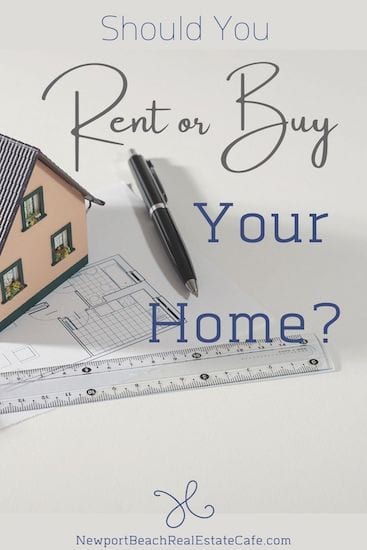Is it better to buy a home or to rent one? It’s a popular question amongst people and one that splits opinions everywhere right down the middle. The answer may be yes or no depending on a number of factors that we will be looking at momentarily to help you make an informed decision with regards to what path is best for you.
1) The Cost Factor
When leasing, you’ll normally be required to fork out about three times the agreed rental cost upfront. If that stands at say $2,000-a-month then you should have $4,000 or more with the initial costs including the security deposit, move in charges and other related expenses.

Homeownership, on the other hand, naturally has a lot more upfront costs as you’ll normally be required at the get-go to meet a fifth of the purchase price of a normal mortgage. If you are obtaining an FHA loan, then you will be required to have PMI, private mortgage insurance, that figure decreases by 5% and to put this into perspective lets consider an example of a $500,000 purchase. If you are getting an FHA loan, the down payment will be 3% of the purchase price which in this case is $15,000. You will be required to get PMI insurance for this loan program.
However, it is important to shop as there are generally many competitive loan programs available.
2) Credit Score
An inferior FICO score such as a score of 620, you will be unable to obtain a loan with a competitive interest rate. What it will get you is a seat across the table from predatory lenders who are prepared to take advantage for exorbitant returns. So if you are in such a predicament it’s best to rent until you are able to improve your credit score and report.
Be sure to speak with a reputable lender who can provide you with guidance on how to clean up the credit report and improve the overall FICO score.
3) Debt Ratio
 A high debt to income ratio may prevent you from being able to obtain a loan that you can afford! That said, there are two aspects to a debt ratio namely the back-end and the front-end. The latter encompasses a ratio of insurance (PITI), taxes and mortgage payments to your monthly earnings while the back-end is the proportion of the PITI fees plus monthly debt expenditure to your earnings total.
A high debt to income ratio may prevent you from being able to obtain a loan that you can afford! That said, there are two aspects to a debt ratio namely the back-end and the front-end. The latter encompasses a ratio of insurance (PITI), taxes and mortgage payments to your monthly earnings while the back-end is the proportion of the PITI fees plus monthly debt expenditure to your earnings total.
If you have credit card debt, then be sure to pay it off as this will reduce the debt to income ratio. Try not to utilize credit cards and accumulate debt which is difficult to pay off. There are many ways to save money and consider your spending habits, whether you are considering renting or buying. Having high credit card debt will negatively impact your FICO score.
4) Job Security
Are you in danger of losing your job in the foreseeable future? That is a frightening consideration. If so, it might be important to note that your mortgage payments will be a tall order for your unemployment compensation which will barely cover it all. If a home buyer thinks that their employment is at risk, then it is best not to proceed with a home purchase and take on debt that cannot be repaid.
5) The Freedom Factor
When you own your own home, you have the freedom to make changes to it as you see fit. Change the color of the  interior, change the window coverings and you will not need landlord approval.
interior, change the window coverings and you will not need landlord approval.
“No pets allowed”, “No renovations”, “No doing this or that” often makeup landlord-tenant bylaws which enforce shackles to your freedom and way of living. You can’t do whatever you want whenever you want without getting the green light first when renting a home.
Should you decide to be a homeowner and live in a community which is governed by an HOA, there are CC&R’s which are the rules and regulations of the community. You may not have total freedom to create a Fred Flinstone house, however, there will be general rules and regulations for you to consider BEFORE you purchase!
6) Maintenance Considerations
Owning a home is not that different from owning a dog in that you have to constantly take care of it. Maintenance is an essential part of ensuring home longevity and it’s sometimes a matter of necessity rather than convenience. You might not have sizeable pockets, or the desire, to turn to professionals every time there’s a problem. If you rent though, unless something occurs due to some fault of your own, the landlord will have to foot the maintenance bill. However, the maintenance expectation in a landlord-tenant relationship should be reviewed before signing a lease agreement. There are some landlords who will pay for “some” expenses for the home and after that, they will expect the tenant to pay.
7) Tax Advantages
Be sure to consult with your tax advisor. Purchasing a home may offer tax write-offs including mortgage interest and property tax. This is an important consideration when factoring in the overall financial implications. If a buyer has a high salary with very few write-offs, then a purchase may be more beneficial. Consult your tax advisor for advice.
8) When Renting Makes More Sense
Sometimes, buying a home just doesn’t make any sense. For instance, it would be more prudent to opt for a $30,000 annual lease total as opposed to a yearly mortgage spending of twice that amount. Should you decide to purchase, be sure to obtain a loan that is manageable, and know if the interest rate is going to adjust.
So be sure to do the math. Consider your annual rent expenditure and expenses. These include the security deposit, insurance premiums, monthly rent. Factor that in against mortgage payments including closing costs, maintenance, homeowner’s insurance premiums, property tax, and more. Alternatively, utilize an online mortgage calculator to help you get an accurate estimate with either option. Once you do, it should become clear which choice suits you best.
A lender will help you to decide if you can afford the monthly outlay of a mortgage payment. And even if the buyer has the resources to pay cash for a home and then that ties up ALL of their resources, that may be a risky investment.
Takeaway
There are many considerations if someone is considering purchasing a home or renting a home. Be sure to consult with your tax advisor or financial planner to determine if it makes economic sense to purchase or to rent. As a buyer, it is important to ensure that even if you purchase a home, you have some reserves available after the purchase. There are times when renting just makes more sense.
Find Other Valuable Resources for “Is it Better to Buy or Rent a Home?” from Real Estate Professionals Across the Country. Please check out the articles below, and please share across Social Media if you enjoyed the articles
Should I Buy or Rent my Next Place is an excellent article written by Kevin Vitali who discusses the power of home ownership.
Should I Buy a Home or Keep Renting: Read more about the benefits of purchasing a home versus continue to rent in this article from Glenn Shelhamer.
Another excellent resource from Anita Clark Should I Sell or Rent my Home covers information if you are moving from your current home and need to decide if you are going to sell or rent it out.
5 Perfect Reasons to Stop Renting and Start Buying a House – Is buying a home overrated? This article discusses a few excellent reasons to stop renting and start buying written by Xavier DeBuck.
About the Author
The above real estate article “Is it Better to Buy or Rent a Home?” was written by Sharon Paxson of Newport Beach Real Estate. Having experience representing buyers, sellers, and landlords with their real estate transactions since 2005, we welcome the opportunity to share our expertise and guide you through the home buying or selling process.
We service the following Orange County CA areas: Corona del Mar, Huntington Beach, Laguna Beach, Newport Beach, Newport Coast, and more! If you are considering selling your home, we welcome the opportunity to work with you and list your home with a top Newport Beach CA Realtor.
